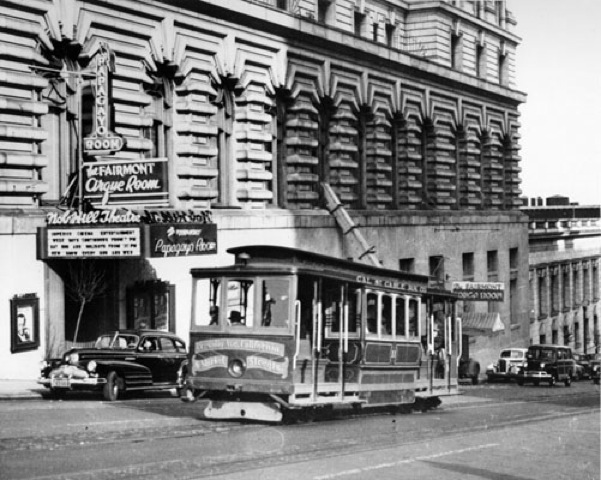A native San Franciscan remembers Joe Jung's restaurant
 |
|
by Tony Robles/PNN
"So Very Hard to go" The faces glide across the pane glass window. They come into focus and just as quickly fade. I stand inside a department store on Market Street of which I am a security guard. It is 1990 and I am a man. I remember walking down this street with my Grandma. I remember Market Street bearing scars and pockmarks created by bulldozers and jackhammers. I didn’t know what was going on. I imagined riding the Muni bus and getting swallowed up by the ground. I’d ride the bus with my eyes closed until Market Street was in the distance. I was just a kid. I didn’t know that San Francisco was making way for the Bart system. I only knew that I didn’t want to be swallowed up. I’m dressed in my polyester security guard uniform. I look out the window at the new shopping center that has risen out of the ground. It’s the new San Francisco Shopping Center and people flock to it as if it was a religious shrine. I look out the window. Shoppers come in and out and are being watched by the cameras on the ceiling—especially the black shoppers. I was in the loss prevention department. The plainclothes officers in the department carry badges and handcuffs. I carry the polyester on my back. I was mad at the new shopping center across the street. I was mad at the engineers, the architects, the cement masons—all of them. I was mad at the entire structure and what it represented. I saw the big cars and the tourists and the business people and the young. I saw them walk through the swinging doors. I watched the houseless people watching the shoppers carrying bags as they left. I watched. I remembered what was there before the mall. The Emporium Department Store stood there alongside smaller businesses. I used to go to the Emporium when I was a kid to sit on Santa Claus’ lap. On the roof were carnival rides. It was a magic place. Even more magical was a place a few doors down. It was a Chinese cafeteria called Joe Jung’s. My grandmother used to eat there. We’d walk inside and grab a tray. I’d slide the orange tray across the rail, gliding past all kinds of delicious food; chow mein, fried rice, pork noodle soup, roast beef, turkey and my favorite, lime jello with fruit cocktail. Grandma wore colorful scarves and big sunglasses. She would pay for the food and we’d sit with other Filipino elders. Grandma would talk and laugh in Tagalog. I would listen and not listen at the same time. I was busy with my lime jello. The elders would laugh while I sat slurping at it. I didn’t know it at the time but my grandmother’s friends were survivors. They were the manongs and manangs (Filipino word of respect for elders) who came to America in the early days. I watched them eat their rice. They would look at me and smile. I wondered what they were thinking. I imagined what they looked like when they were young. It would be years later that I would see their faces in black and white pictures in a book called Liwanag—a collection of Filipino-American writing whose pages talked about our resistance as Filipinos against those who would colonize our lands and our minds. The words were written by such writers as Al Robles, Oscar Penaranda, Serafin Syquia and Lou Syquia. I remember the laughter of my elders at Joe Jung’s. I stood looking at the San Francisco Center. I refused to go there. People told me of the massive floors and the circular escalator but I couldn’t have cared less. I still heard the laughter of my elders and the smell of chow mein and the sound my plastic tray made as it slid along the rail. I wondered what became of the elders. I wondered if the shoppers knew what had once stood in its place. I wondered what the shoppers stood for. I wondered if they would care. © 2008 Tony Robles |



